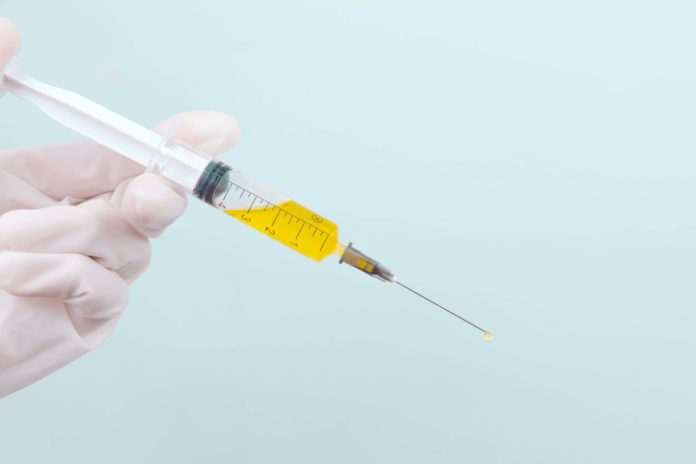 100vw, 2560px”><figcaption id=) Photo: Diana Polekhina on Unsplash
Photo: Diana Polekhina on UnsplashPharmaceutical and biotechnology company Moderna is set to start human trials of an HIV vaccine based on the same mRNA technology as its COVID-19 vaccine.
Both vaccines being tested are based on mRNA technology, which, per the CDC, “teach our cells how to make a protein — or even just a piece of a protein — that triggers an immune response inside our bodies. That immune response, which produces antibodies, is what protects us from getting infected if the real virus enters our bodies.”
Moderna is seeking 56 HIV-negative people between 18 and 50 years old for the randomized study, which will evaluate the safety of two vaccines.
The trial was slated begin on August 19 and run through May 2023.
MrNA technology gained widespread recognition after both Moderna and Pfizer-BioNTech released their mRNA-based COVID-19 vaccines.
As a result, Moderna has turned its attention to other possible uses for mRNA vaccines, including HIV, influenza, and other infectious diseases.
Moderna’s HIV vaccines have been developed in conjunction with the University of Texas at San Antonio, George Washington University, Fred Hutchinson Cancer Research Center, and Emory University.
There is no guarantee that Moderna’s trials will prove successful, as no HIV vaccine trial has yet moved beyond Phase 2 trials.
As Popular Science notes, the difficulty in developing vaccines for HIV has been in the way the virus “integrates itself into the human genome rapidly — within 72 hours of transmission — thus producing an irreversible infection.”
To combat the virus, a person’s body requires “high levels of protective neutralizing antibodies [tp] be present at the time of transmission to completely prevent infection.”
Much in the same way that mRNA COVID-19 vaccines help develop and sustain antibody levels in the body to combat coronavirus infection, an mRNA HIV vaccine could develop and sustain the necessary antibodies required to fight off HIV at the point of infection.
An HIV vaccine would offer an additional method of combating — and hopefully ending — the HIV epidemic, after the virus was first detected among gay men in the U.S. in 1981.
Current treatment methods involve antiretroviral medications, which suppress the levels of the virus in a person’s body until they reach “undetectable” status — effectively meaning that levels are so low they cannot be detected by normal testing.
Being undetectable also effectively prevents the virus from being transmitted to an HIV-negative person during condomless sex, research has found. A recent study of serodiscordant couples found zero instances of HIV transmission where the HIV-positive partner was undetectable.
Current antiretroviral therapy typically involves daily medication, but earlier this year ViiV Healthcare, a subsidiary of GlaxoSmithKline, achieved FDA approval for its once-monthly injectable treatment — effectively reducing treatment days to just 12 per year.
What’s more, ViiV found that the treatment was still effective when administered every two months, further reducing the number of treatment days required for those living with HIV.
Antiretroviral medication can also be used as pre-exposure prophylaxis — also known as PrEP, or by the brand names Truvada and Descovy — to help prevent HIV-negative individuals from becoming infected with the virus.
A once-daily pill, PrEP reduces the risk of transmission of the virus during sex by 99%, according to the CDC.
New forms of PrEP are currently being trialed by pharmaceutical companies which could reduce the pill dosage to once every month, or an injection once every two months.
Merck recently announced that its once-monthly PrEP pill had proven to be “extremely potent” in second phase trials and said it was “probably a little more forgiving” than daily PrEP because of its long-lasting nature and once-monthly requirement.
Last year, GlaxoSmithKline announced that its injectable PrEP treatment — administered every two months — was more effective at reducing the risk of transmission of HIV than Truvada.
Read More:
A surprising number of gay people have faked an orgasm, study finds
OnlyFans will bar sexually explicit videos starting in October
Christian pilot rants about being gay to passengers during American Airlines flight








